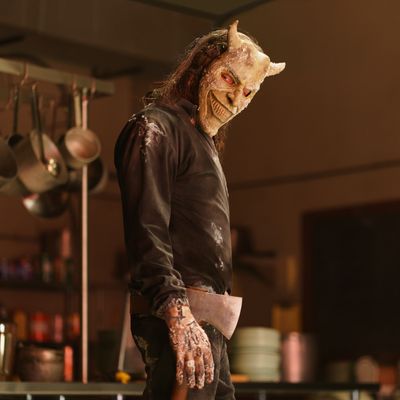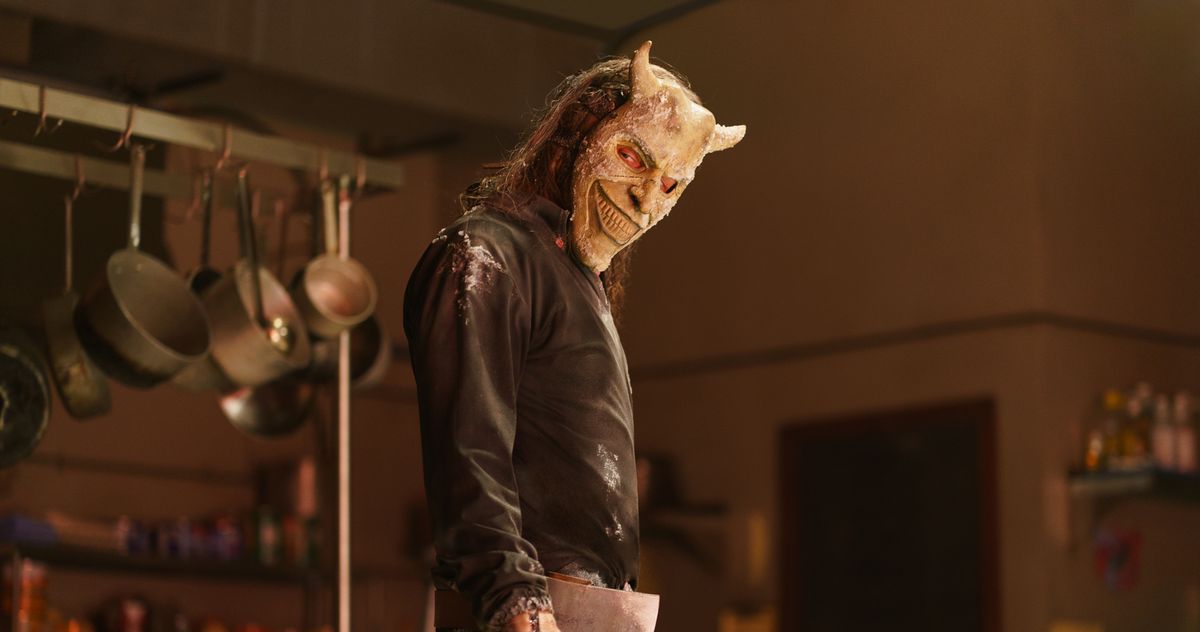
Photo: Sabrina Lantos/Universal Pictures
You may remember that the Grabber — the grinning-demon-masked, child-kidnapping psycho memorably played with reedy glee by Ethan Hawke in The Black Phone — was certifiably killed at the end of that first film. And while the mere death of the villain has never gotten in the way of a good horror sequel, it does appear to have prompted some reinvention for Black Phone 2Scott Derrickson’s follow-up to his 2022 hit. All too often, these follow-ups take it upon themselves to deliver more of the same: the same setups, the same scares, the same vibes. It is all product, after all. What’s remarkable about Black Phone 2 is how unique The Black Phone it is in some ways. That may provoke disappointment from some quarters, but it also makes for a unique, unexpected experience.
The characters remain largely the same, however. The new film picks up Finney Blake (Mason Thames) and his younger sister, Gwen (Madeleine McGraw), in 1982, a few years after the events of the first movie. Everyone in north Denver knows Finn as the kid who escaped (and killed) the Grabber, but for some reason this hasn’t led to his valorization; quite the contrary, when we first see him, he’s beating the crap out of some new kid at school who dared to bring up his past. In other words, Finn is on the verge of becoming the surly bully he always feared. The sensitive Gwen, meanwhile, gifted (or cursed) with psychic visions that allowed her to locate her brother in the first film, is called a witch at school. Now, she’s beset by a new set of dreams: In these, she sees her mother, Hope (Anna Lore), as a young girl in 1958 making a mysterious phone call in the middle of a frozen expanse near Alpine Lake, a winter camp for Christian youth; on the other end of the phone, in 1982, dream-Gwen picks up the call.
Gwen, whose psychic powers came from her late mother, also has visions of boys being pursued and killed in the woods near the camp. From the beyond, the victims seem to be sending messages to Hope in 1958 and to Gwen in 1982. Finn and Gwen, along with their pal Ernesto (Miguel Mora, who played his character’s brother in the first film), decide to investigate further and sign up to be counselors in training at Alpine Lake. When a massive snowstorm hits just as they arrive, they wind up all by themselves at the camp, with nobody around except Alpine Lake’s director, Armando (Demián Bichir), his niece Mustang (Arianna Rivas), and an older Christian couple (Graham Abbey and Maev Beaty) who don’t like the kids’ propensity to use swear words and eventually become convinced that Gwen, with her dream visions, is communing with Sss-satan.
No, it’s just the Grabber, now lurking in a post-death dimension not unlike the one inhabited by his victims whose souls are doomed to hover in this grisly limbolike state until their bodies are found and their murders avenged. The Grabber hounds Finn through an old phone booth and torments Gwen through her dreams. Turning this wannabe demon into an actual demon — a Freddie Krueger type with the power to enter his victims’ minds during sleep and to do them physical harm — is an interesting choice, as it gives him a new set of powers from the first film. That makes the scares a bit less precise, a bit less logical. You might go nuts trying to figure out exactly how anything works in this movie. But in the right hands, this can be a strength too. It certainly enhances the overall sense of dread, since we’re now in a world whose rules haven’t been clearly defined. (For what it’s worth, my son, a big fan of the first Black Phonefound this new movie to be a lot scarier.)
This switch frees Derrickson from the by-now mundane requirements of telling a typical horror story, allowing him instead to indulge the unsettling stylization of the kind that made previous efforts like Sinister so successful. With its lengthy, grainy dream sequences, its seas of analog hiss, and its grisly suggestiveness, Black Phone 2 unfolds almost like a poisoned tone poem; the dialogue is hushed, the pace at times odd and slow. The whole movie feels like an actual nightmare. The washed-out, wintry setting helps as well; while the frozen lakes and distant mountains of this remote stretch of Colorado don’t always look entirely realistic, they do match the otherworldly mood in which dream and reality seem to slip in and out of one another.
Perhaps most significantly, Black Phone 2 corrects one of the key shortcomings of the first picture: Gwen is a more compelling character than Finn (and McGraw a more interesting actor than Thames), so the original’s occasional sidelining of the sister was a buzzkill. Now, Gwen is front and center, and McGraw plays her with a tense, haunted awkwardness. This hesitation also pays off spectacularly in the film’s emotionally intense climax. Indeed, all the actors seem genuinely committed to their parts, which gives everything a convincing gravity that feels true, and which runs counter to the jokey messiness of so many modern horror sequels.
To be clear, there’s also dumb stuff in there Black Phone 2 — a dorky subplot about Finn’s marijuana use, as well as the usual ham-handed trauma-speak that now infects this genre, come to mind — but the film’s overall sincerity, its willingness to drift creepily in directions we might not have expected, is bracing. Even the religious stuff has a refreshing earnestness. At one point, Gwen prays to Jesus for help, much to the bemusement (and adoration) of Ernesto. It shouldn’t be surprising — this is, after all, a girl who has supernatural visions in which dead people speak to her — but it is, because horror often only pays cynical lip service to this sort of thing. Derrickson, a devout Christian, clearly takes matters of the afterlife and trapped souls seriously. Such welcome candidness to questions of spirituality is enough to move even a resolute non-believer like me. Whether he’ll be able to keep it up for Black Phone 3: The Grabber Goes Bananas remains to be seen.
See All

اترك تعليقاً